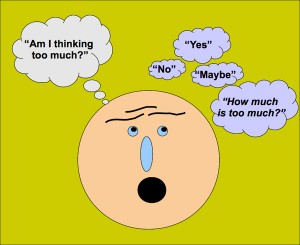 “I think too much,” someone with depression will say. “How can I stop?”
“I think too much,” someone with depression will say. “How can I stop?”
“I overthink things,” someone with anxiety will say. “How can I stop?”
We’re taught that thinking is a good thing — right? Thinking is how we avoid danger, make decisions about our priorities, decide who to spend time and figure out what to eat, along with a million other daily choices.
But there’s a difference between thinking that helps move us to someplace new and thinking that keeps us stuck in the same place. I’ve come to know that when a teen or adult client says, “I’m thinking too much,” it’s usually their way of saying “I’m thinking in circles right now and it’s driving me crazy.”
At some point in our lives, we all get stuck thinking about big choices, what others may think of us, past regrets, and future possibilities. Usually this isn’t fun thinking, like fantasizing about a much-needed vacation. Instead it sounds more like this: “But if this happens…” or “If only I had done this…” or “I can’t believe I …” or “I want this but I don’t know if I want this thing that goes with it …” Oftentimes it’s this crazy-making kind of thinking — along with the anxiety that usually goes with it — that brings people into therapy for the first time.
There are a few ways out of this analysis paralysis. Sometimes speaking thoughts out loud to someone without a stake in the outcome — like a therapist — can help see us see situations with more clarity. Sometimes making small decisions regardless of thoughts can help break us free of the mind’s spin-cycle. And, of course, dealing with underlying anxiety or depression can help change the quality and nature of our thoughts. Reflection is useful. Round and round rumination is not.

